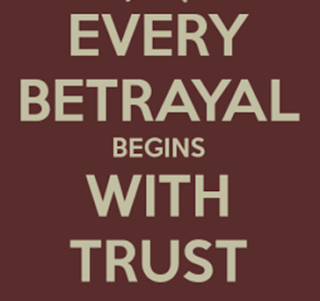After being betrayed, most of us want two things, usually at the same time. We want to wound the person who hurt us—as deeply and as excruciatingly—as we've been wounded, and we want to rise above the situation and offer that person forgiveness. But neither of these tactics work. Wounding words tend to boomerang and make you feel as terrible as the person you wanted to hurt. Forgiveness, especially if halfhearted, tends to come off as condescension.
There are actions, though, that you can take to can heal yourself. Every hurt has its own story, and so does every healing. But we can say this: You can heal yourself when you've filled the hole left behind by a betrayal, and you can heal the other person when you sincerely drop the need for revenge.
Remember, the only betrayals that inflict damage are the ones where an intimate bond has been torn. When you build trust with another person, you are able to feel their emotions as keenly as you feel your own. If you have experienced such bonding, you know that it is a kind of higher reality—and when that bond is ripped apart, it's as if you've lost part of yourself. Then the self blame begins so how can you get out of torment and find yourself again?
1. Gain some detachment. Stand back and view yourself as if you were the helper, not the victim.
2. Don't indulge in emotions you cannot afford. Don't act as if you’re feeling worse than you really are—or better.
3. Make a plan for emotional recovery. Look at where you hurt, feel wounded or see yourself as victimized, then set out to heal these areas. Don't rely simply on letting time do it for you.
4. Feel the hole inside and grieve over it—but promise yourself that you will fill it.
5. Seek a confidant who has survived the same betrayal and has come out on the other side.
6. Work toward a tomorrow that will be better than yesterday. Don't fixate on the past or what might have been.
7. Counter self-pity by being of service to someone else. Counter regret by seeking out activities that build your self-esteem.
It requires a good deal of objectivity to set about following such a program. Nothing is easier, of course, than doing the opposite, for example:
1. Dwelling obsessively on how you were wronged. Feeling exultant in our self-righteous pain.
2. Turning your pain into an ongoing drama.
3. Acting erratic and scattered, with no plan for getting better.
4. Mourning your loss forever. Not looking honestly at the hole inside yourself because it is too painful or you feel too weak.
5. Talking to the wrong people about your woes. Seeking out those who keep agreeing with you and amplifying our resentment by egging you on.
6. Idealizing the past. Obsessing over the good times that are gone.
7. Letting self-pity and regret dominate your state of mind.
This kind of behavior only makes a betrayal linger.
If you find yourself in the position of being the wronged party, sit down with these two seven-step programs in front of you. With a pen and paper, write down all the ways you are following the healing program and then the ways in which you are sticking with victimization one. Be candid and objective. It is healing in itself to write down how you are really doing, because the key to psychological healing is self-awareness.
The two lists—and choices—may be in stark contrast, but real life is blurry around the edges. One day you are on the right track; the next day you are a train wreck. The key is to keep being kind to yourself. You know you are being kind when you begin to feel kind toward the one who betrayed you. I know that sounds impossible when your pain is acute, but you can't be kind to yourself unless that feeling of ease, acceptance, tolerance and non judgment extends beyond your self-interest. Otherwise, kindness is simply a mask for egotism. The idea of "I'm getting better; I hope he rots in hell" is an unresolvable contradiction.
In the end, when you reach that state of being healed, you will see how fortunate you are. As horrible as betrayal is, forgiveness belongs to those who know how to love in the first place, and you are one of them.
Source: Deepak Chopra













